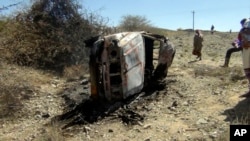The United States is not talking about the details of the reported American drone strikes that the Yemeni government says helped kill 55 al-Qaida militants in the last several days. The U.S. Defense Department, however, says it is has "good reason" to continue to work with the Yemenis to combat the threat presented by the terrorist group known as al-Qaida in the Arabian Peninsula.
Yemen, reportedly backed by U.S. drone strikes, has been conducting what it says is an "unprecedented" aerial campaign against an al-Qaida stronghold hidden in the Middle Eastern country's remote southern mountains. The militants are part of al-Qaida in the Arabian Peninsula, a group that has been linked to failed terror plots against the United States, including attempts to detonate bombs on U.S.-bound airliners.
The U.S. has declined to discuss its use of drones in any detail. But on Tuesday, Defense Department spokesman Rear Admiral John Kirby said the assault on the militants was entirely justified.
"Al-Qaida's made no secret of the fact that as an organization, one of their philosophical planks is to target the United States, Americans and Westerners. And so I think we have good reason to take that intention at face value," said Kirby.
Kirby said the U.S. military believes the al-Qaida arm in Yemen to be a credible threat, and that is why the Pentagon continues to pursue what he described as "a good strong, military-to-military relationship with the Yemeni armed forces."
Last May, U.S. President Barack Obama spelled out American policies on the use of drones, even as he said the government's preference is to capture individual terrorists, and then interrogate and prosecute them.
"America does not take strikes to punish individuals - we act against terrorists who pose a continuing and imminent threat to the American people, and when there are no other governments capable of effectively addressing the threat,' Obama said.
The U.S. leader said there "must be near-certainty" that no civilians will be killed or injured.
But Letta Tayler, a terrorism researcher at Human Rights Watch in New York, noted that Yemen acknowledged three civilians were killed in the latest drone strikes. She says Obama and the U.S. government have been less than transparent about the U.S. use of drones and the consequences of the attacks.
"Is the U.S. complying with the law in taking lethal action against alleged terrorists, because we do not know for sure if these are terrorists or not, because the U.S. will not give us any information about these strikes? I myself have found clear cases in which the U.S. has killed the wrong people in strikes in Yemen," Tayler said.
She says Americans "need some very clear answers" on what the U.S. is doing in Yemen, whom it is killing and why.
Yemen, reportedly backed by U.S. drone strikes, has been conducting what it says is an "unprecedented" aerial campaign against an al-Qaida stronghold hidden in the Middle Eastern country's remote southern mountains. The militants are part of al-Qaida in the Arabian Peninsula, a group that has been linked to failed terror plots against the United States, including attempts to detonate bombs on U.S.-bound airliners.
The U.S. has declined to discuss its use of drones in any detail. But on Tuesday, Defense Department spokesman Rear Admiral John Kirby said the assault on the militants was entirely justified.
"Al-Qaida's made no secret of the fact that as an organization, one of their philosophical planks is to target the United States, Americans and Westerners. And so I think we have good reason to take that intention at face value," said Kirby.
Kirby said the U.S. military believes the al-Qaida arm in Yemen to be a credible threat, and that is why the Pentagon continues to pursue what he described as "a good strong, military-to-military relationship with the Yemeni armed forces."
Last May, U.S. President Barack Obama spelled out American policies on the use of drones, even as he said the government's preference is to capture individual terrorists, and then interrogate and prosecute them.
"America does not take strikes to punish individuals - we act against terrorists who pose a continuing and imminent threat to the American people, and when there are no other governments capable of effectively addressing the threat,' Obama said.
The U.S. leader said there "must be near-certainty" that no civilians will be killed or injured.
But Letta Tayler, a terrorism researcher at Human Rights Watch in New York, noted that Yemen acknowledged three civilians were killed in the latest drone strikes. She says Obama and the U.S. government have been less than transparent about the U.S. use of drones and the consequences of the attacks.
"Is the U.S. complying with the law in taking lethal action against alleged terrorists, because we do not know for sure if these are terrorists or not, because the U.S. will not give us any information about these strikes? I myself have found clear cases in which the U.S. has killed the wrong people in strikes in Yemen," Tayler said.
She says Americans "need some very clear answers" on what the U.S. is doing in Yemen, whom it is killing and why.










